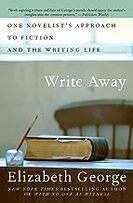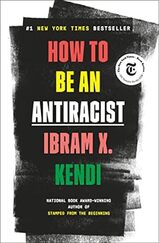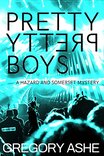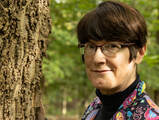| My writing instructor Greg Ashe recommended this book on writing craft by best-selling mystery writer Elizabeth George. Write Away offers fresh insights into characterization, setting, voice, plot, and scene construction. She recommends the writer give her characters “flaws, allow them to doubt themselves about something, see to it that they grow and change, and make certain you are putting them into conflict [for]...conflict is what will bring your characters to life and make them real for the reader.” And “Creating characters who are real to the reader, will evoke an emotional response within the reader.” |
Characterization
The author advocates giving each character a core need. “This is something essential to a person, and automatic striving within him that, when denied, results in [a defense mechanism].”
She says the most important element of character voice “is the character’s attitude. More than anything you can do to illustrate voice for your reader, the character’s attitude will differentiate one character from another.”
Character-specific dialogue “is what all dialogue should aspire to be.” "If your dialogue is distinct enough for each character, you can run the entire scene without tag lines [he said, she said]”
Also: “...dialogue needs to be concise, [avoid] dealing with too many ideas at one time.”
The author advocates giving each character a core need. “This is something essential to a person, and automatic striving within him that, when denied, results in [a defense mechanism].”
She says the most important element of character voice “is the character’s attitude. More than anything you can do to illustrate voice for your reader, the character’s attitude will differentiate one character from another.”
Character-specific dialogue “is what all dialogue should aspire to be.” "If your dialogue is distinct enough for each character, you can run the entire scene without tag lines [he said, she said]”
Also: “...dialogue needs to be concise, [avoid] dealing with too many ideas at one time.”
| Setting The author explains how to create a setting using “specific and telling details. These are details with a message attached to them, the kinds of details that no reader forgets.” “By the end of a novel in which the author deftly handles landscape, the reader feels as if he has been there and has experienced the location firsthand.” |
Story Questions
"No matter how you choose to begin your novel, you have to think about creating an opening that either possesses or promises excitement, intrigue, or high interest for the reader. It should reflect some element of the conflicts [of] the plot [or] some indication of theme.”
“Skilled writers know that what you’re supposed to open up your story. You do this by creating scenes in which you lay down--but do not answer!--dramatic questions…if you do answer a dramatic question in a scene as the novel progresses, you’ve already laid down another. You do this by making partial disclosures instead of giving out all the information you possess.”
"No matter how you choose to begin your novel, you have to think about creating an opening that either possesses or promises excitement, intrigue, or high interest for the reader. It should reflect some element of the conflicts [of] the plot [or] some indication of theme.”
“Skilled writers know that what you’re supposed to open up your story. You do this by creating scenes in which you lay down--but do not answer!--dramatic questions…if you do answer a dramatic question in a scene as the novel progresses, you’ve already laid down another. You do this by making partial disclosures instead of giving out all the information you possess.”
| Scene Building “Think of a scene as you would a complete story, and shape it like a story…begin at a low point…the tension should rise as the conflict brews. At the height of the conflict you should have the climax and [the resolution that follows] propels the entire novel forward.” “make sure that every scene either advances the plot, advances one of the subplots, develops character, or addresses theme.” |
Narrative Unity
“Every sentence in every paragraph you write either should be an amplification of the sentence that precedes it or should address itself to a prevailing [topic]. If the sentence you’re writing does neither, get rid of it.”
“When you write with an awareness of bridges and transitions [between paragraphs], you create an experience for the reader that is seductive and mysterious.” “The last sentence in one paragraph either is directly related to the first sentence in the next paragraph that follows or acts as a prompt that sets up the next paragraph.”
To create narrative unity, each scene advances the plot, each paragraph advances the scene and revolves around a central idea, each sentence within each paragraph addresses the topic of that paragraph.
“Be critical of but not brutal with your writing. If something isn’t essential, get rid of it.”
“Every sentence in every paragraph you write either should be an amplification of the sentence that precedes it or should address itself to a prevailing [topic]. If the sentence you’re writing does neither, get rid of it.”
“When you write with an awareness of bridges and transitions [between paragraphs], you create an experience for the reader that is seductive and mysterious.” “The last sentence in one paragraph either is directly related to the first sentence in the next paragraph that follows or acts as a prompt that sets up the next paragraph.”
To create narrative unity, each scene advances the plot, each paragraph advances the scene and revolves around a central idea, each sentence within each paragraph addresses the topic of that paragraph.
“Be critical of but not brutal with your writing. If something isn’t essential, get rid of it.”
| Immersion “Your objective is to do everything possible to keep the reader in the story.” “Anything in your writing that smacks of device is something that’s going to make your story clunky. Anything that attracts attention to itself within your writing is something that’s going to take the reader out of the story.” |
Write Yourself Silly
“Committing yourself to writing is placing yourself in a highly exposed position. Once your novel is written and published you are at the mercy of critics, the readers, your fellow writers, your family, your friends...”
“Clear your life of the things that keep you from doing the actual writing.”
“Gather knowledge about the craft of writing. Immerse yourself in the art of it. Then write. Write yourself silly.”
“Committing yourself to writing is placing yourself in a highly exposed position. Once your novel is written and published you are at the mercy of critics, the readers, your fellow writers, your family, your friends...”
“Clear your life of the things that keep you from doing the actual writing.”
“Gather knowledge about the craft of writing. Immerse yourself in the art of it. Then write. Write yourself silly.”











 RSS Feed
RSS Feed